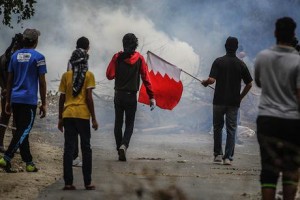Demotix/Sayed Baqer Alkamel. All rights reserved.
“What happens after isqat al netham – the downfall of the regime? What would you do?” I asked a 20-something youth activist, shortly after Bahrain’s uprising in 2011.
He stared; assessing me, and the question I had just asked him. I don’t think it had ever occurred to him. After a very long pause he replied triumphantly, “I would run for parliament.” He folded his arms and leaned back.
“What would you change if you were in parliament?” I prodded. Another uncomfortable but shorter silence. “I don’t know…” he shrugged, his arms still folded. “Education?” he said hesitantly, almost seeking my approval. “What would you change about education?” I continued.
I was retelling this story at a session on “Youth, Economics and Violence: Implications for Future Conflict” at Salzburg Global Seminar, Austria, in April.
During periods of social upheaval—and amidst the Arab awakening—a lot of energy is invested into violent and non-violent resistance. How to go from dictatorship to democracy; deposing leaders and dismantling regimes. Comparatively less energy and thought is given to the necessary development that must take place thereafter—and preferably in tandem.
My intention is not to discredit non-violent resistance, but is this the (only) type of activism we need in the (Arab) world? In some cases it has been successful in achieving a political transition and greater accountability. But in all cases it has been unsuccessful in achieving other desired social outcomes. What are we revolutionising? Education? Healthcare? Housing? Or has revolution become both the means and the end?
In fact, some of the same youth activists have begun to intimidate the villages in which they live. Threatening with punitive measures, such as molotovs, should someone dare violate a “work strike” to try to earn an already meagre living; or keeping the door to their home locked at night—incidentally preventing the activists from rotating their hiding places from the security forces. The irony is that in fighting oppression, marginalisation, and economic inequality, they have perpetuated and deepened this very injustice.
During the session in Salzburg we—some 50 program officers, activists, university professors and experts from diverse fields as anthropology, economics, political science, education, psychology and law enforcement—debated whether or not violence is a necessary tool for youth to employ in creating peace. I believe that in everything that we do, the process and intentions must mirror the outcome. We must “be the change” and have the patience and fortitude to go through the inner transformation required to create the external change we seek.
Seeds of violence, mistrust, fragmentation and exclusion are unlikely to provide a fertile soil for peace, equality and social cohesion. Indeed it is a long road to Damascus…
At the 2011 Skoll World Forum on Social Entrepreneurship at Oxford University—the ‘Davos’ of social innovation—my cofounder and I had an insightful conversation with those working with the Archbishop Desmond Tutu.
They said that one of their biggest regrets was waiting for so long to focus on development while fighting for freedom. It meant that even post-Apartheid, generations of South Africans still went through broken systems—a sentiment that was echoed on my recent trip to South Africa, a country ranked among the highest on the Gini index for income inequality.
US inventor and visionary Buckminster Fuller said, “You never change things by fighting the existing reality. To change something, build a new model that makes the existing model obsolete.” I love this quote. This is very much how the natural world operates.
Resilience requires diversity and inclusion of all parts of a system—not only to weather a storm or disturbance, but also to cultivate and build new solutions. So how can we go from violent or even non-violent resistance to non-violent resilience?
When I look at the way youth activists in Bahrain perfectly synchronise a tire burning operation to disrupt roads; or strategically place old bathtubs and giant teddy bears as blockades to prevent entry into their villages; or shoot cut up metal rods out of fire extinguishers, I am both impressed and optimistic.
I am impressed because I see innovation and bootstrapping. I see risk-taking and courage; teamwork and brotherhood; commitment and conviction. I am optimistic because I see a yearning for a life of purpose and meaning.
All of these qualities and competencies are valuable in any entrepreneurial venture, but especially in social entrepreneurship. Embedded with a different set of values, there is an unsurpassable opportunity to mobilise this energy into a new kind of activism: one that builds new models.
Having developed various youth trainings on social entrepreneurship and values-based leadership through my own social enterprise, I have seen first-hand the power that just two days can make: stimulating cognitive empathy; empowering and inspiring; and fostering more collaborative relationships between youth on opposite sides of political, religious and socio-economic spectrums, as they rethink and reclaim the future they will jointly inherit.
No government in the world can or should be expected to solve all of society’s problems. And while social entrepreneurship is not a panacea, it should be an integral component of resilient activism.
After winning a small grant from UNESCO, we are now developing a beneficiary-led fellows program and toolkit that is specific to the issues facing the Arab world. We have high hopes that this program—How to Reimagine the Middle East—will mobilise an activism of the heart. An activism that is for, not against. One that is inclusive and collaborative. One that engineers hope and dignity, as youth confront the most pressing challenges ever facing a human generation.
This article first appeared on openDemocracy

